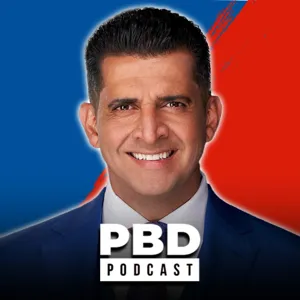Podcast Summary
Insights from the fashion industry and financial education: Fashion People podcast reveals industry secrets and 1,000,000 Bazillion Live Tour teaches financial basics
There's always more to the story behind the glitz and glamour of the fashion industry. In the new podcast "Fashion People," industry insiders discuss the real happenings behind closed doors, from creative director changes to financial struggles and public mishaps. Meanwhile, for those interested in learning about economics and financial basics, the 1,000,000 Bazillion Live Tour is coming to schools to teach important lessons about budgeting, investing, and saving. And while we may have missed most of the solar eclipse, it serves as a reminder that even when we can't see the whole picture, there's still value in what we can observe.
Significance of once-in-a-lifetime experiences vs. tangible policy benefits: The Biden administration's student loan debt relief program provides tangible benefits, while the professor's solar eclipse experience highlights the importance of once-in-a-lifetime experiences, both significant in their own ways.
The professor's priority during the solar eclipse prevented our interview from happening, but the Biden administration's student loan debt relief program has been providing relief to many people despite legal challenges. The professor's eclipse experience is a reminder of the significance of experiencing once-in-a-lifetime events, while the student loan relief is a tangible result of the Biden administration's policies, which may not be fully appreciated until later. The administration seems to be rushing to make visible progress before the November elections, as many of their initiatives' benefits will only be felt in the long term.
Student loan debt burden for older Americans: Over a million borrowers aged 62+ hold student loan debt, totaling billions, which can exceed the original amount borrowed due to interest rates, causing significant financial strain
President Biden's attempt to cancel student loan debt for millions of Americans, although met with resistance from the courts, highlights the significant burden of student loans even for older Americans. According to recent data, over a million borrowers aged 62 and above still hold student loan debt, totaling billions of dollars. This debt burden, which can exceed the original amount borrowed due to interest rates, can be debilitating for many individuals. The latest effort by the Biden administration to address this issue has brought attention to the long-term impact of student loans on individuals' financial well-being. Despite the ongoing legal battles, the conversation around student loan debt cancellation continues to gain momentum, underscoring the need for sustainable solutions to alleviate the financial strain caused by student loans.
Jamie Dimon's Economic Predictions Should be Skeptically Viewed: Despite being a powerful CEO, Jamie Dimon's economic predictions should be met with skepticism due to past inaccuracies and the inherent uncertainty of economic forecasting.
While Jamie Dimon, the CEO of the largest bank in the country, may hold a powerful position and have profitable results, his opinions on economic matters, particularly regarding interest rates, should not be given undue weight. Dimon's past predictions have been inaccurate, and no one can truly predict the economy's future. The recent headline in The Wall Street Journal about an impending interest rate spike from Dimon's annual letter to shareholders is just another example of overhyped speculation. It's important to remember that even individuals in positions of power and wealth do not have a crystal ball. The idea that Dimon's opinions are valuable economic insights is misguided and contributes to unnecessary anxiety and uncertainty in the financial world. The public would benefit from a more critical and skeptical approach to such proclamations.
Navigating the post-pandemic economy: The post-pandemic economy is fundamentally changed and requires new models and adaptability
The post-pandemic economy is fundamentally different than what we've seen before. Supply shocks, demand changes, and the emotional trauma caused by the pandemic have all impacted the way people shop and live. Despite this, some continue to use outdated models and expect everything to return to normal. Federal Reserve Chair Jerome Powell acknowledged that the Fed doesn't have all the answers and is doing the best they can with the available data. The excitement surrounding events like the solar eclipse serves as a reminder of the wonders of science and the importance of staying curious and adaptable in the face of uncertainty.
Kids trading pencil nubs as collectibles: Kids are trading small pencil nubs for candies and other items, showcasing the human desire to collect and trade, even for seemingly insignificant items.
In today's world, even seemingly insignificant items like pencils can hold value and become collectibles among kids. The Wall Street Journal reported that students are trading small pencil nubs for candies and other items, making them a status symbol. This trend highlights the idea that there is a market for everything, even relics of a time when technology wasn't as prevalent. The article also showcases the quirky behaviors of kids today, who can afford to engage in such activities because tests and exams are now often taken on computers. This trend is a reminder that even small, seemingly insignificant items can hold value and appeal to collectors. It's a testament to the human desire to collect and trade, and it adds a touch of nostalgia to modern life. So, if you have a drawer full of old pencils, you might just find a buyer for them online.
Revisiting Reading Instruction Methods: The podcast 'Sold A Story' emphasizes the need to reevaluate and enhance reading instruction techniques to improve literacy rates in schools, inspired by the concept of 'overcapacity' in clean energy production.
The podcast "Sold A Story" has shed light on the issue of declining literacy rates in schools across the nation, including in Wisconsin. The podcast, led by Bridget Bodner as director and Francesca Levy as executive director of digital, has highlighted the importance of revisiting and improving reading instruction methods. The concept of "overcapacity," or the excessive production of clean energy, may seem unrelated, but the podcast has inspired a renewed focus on literacy, with new episodes available now. The hosts are advocating for a change in approach to reading education, as they believe the current methods have fallen short. This podcast has left a significant impact on the speaker and they plan to share it with everyone they meet.






